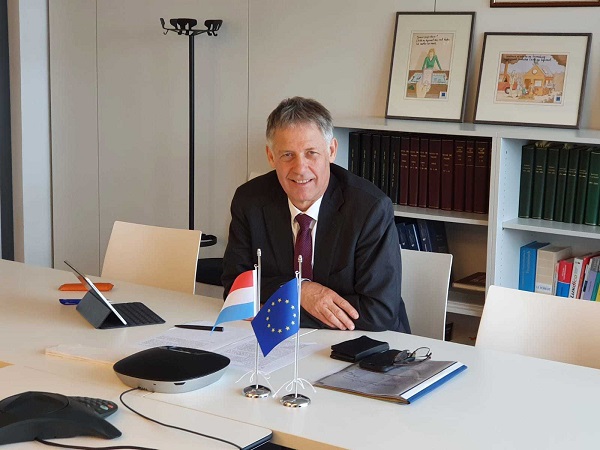 Henri Kox, Luxembourg's Minister of Internal Security;
Credit: Ministry of Internal Security
Henri Kox, Luxembourg's Minister of Internal Security;
Credit: Ministry of Internal Security
On Thursday 28 January 2021, Luxembourg's Minister of Internal Security, Henri Kox, participated in the informal afternoon session of the European Union's Home Affairs Council, which was held by video conference.
The Portuguese presidency, which took over from the German presidency on 1 January 2021, expressed its desire to work for a resilient Europe, for instance by strengthening the capacities of law enforcement agencies in order to identify threats and mitigate their effects and to be better able to react to events such as the COVID-19 crisis.
Discussions on the Schengen Area focussed on the unilateral measures of member states taken in response to the COVID-19 crisis and the efforts that can be made to strengthen coordination within the EU as well as harmonisation of the implementation of EU Council recommendations on temporary restrictions on non-essential travel.
Considering that the vaccination process is underway within the EU, the aim is to make internal border controls the exception and to use them only as a last resort, whilst alternative, less intrusive measures should become the norm. In this context, Minister Henri Kox reiterated that “in our fight against COVID-19, we must not lose sight of our European achievements in terms of free movement and allow movement, at least essential [movement], without hindrance. Cross-border communities can no longer bear the brunt of the escalation that takes hold of our capitals with each outbreak of this pandemic”. In addition, Luxembourg's Minister of Internal Security affirmed that the member states which make important efforts in terms of tests and sequencing should not be penalised by internal border closures.
Following the European Commission's publication in December of its legislative proposal to overhaul the European police agency Europol's mandate, this meeting was the first opportunity for Home Affairs Ministers to discuss the subject. This notably involves strengthening the agency's role as a nerve centre for data exchange and creating a reference centre for research and technological innovation in the field of internal security. The proposal also aims to modernise Europol's mandate by seeking to ensure its capacity to analyse and process large volumes of data as well as by consolidating cooperation between the agency and the private sector to be able to better support actions and investigations by member states.
While the internal consultations of the various Member States relating to the proposal are still underway, all agreed on the need to strengthen Europol to make it better able to face modern challenges whilst fully respecting fundamental freedoms and the right to the protection of personal data.








